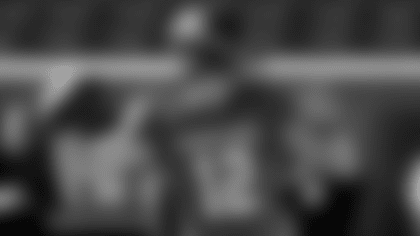Fans see it when Defensive Backs Coach Raheem Morris meets with his guys on the sideline, but that group spends many more unseen hours in darkened rooms watching tape
Editor's Note: The following feature is excerpted from *Buccaneers Review, Volume 3, Issue 5. Buccaneers Review is the Tampa Bay Buccaneers' ground-breaking answer to the traditional game program. Sold at every Tampa Bay home game, it includes entirely new material, cover to cover, every issue. The magazine-style publication includes exclusive interviews with Buccaneer players and their opponents; in-depth feature stories; a close look at the opponent and their key players; cheerleader features; columns by Head Coach Jon Gruden and long-time Buc standout Dave Moore; rosters, depth charts and much more. For the Carolina game in Week Six, Buccaneers Review gave fans a look at a part of the game they rarely see, the untold hours of meeting time that prepare a team for its next opponent.*
Running back Cadillac Williams — still on the mend from the serious knee injury he suffered in 2007 — strolled casually into the locker room in the middle of the week as the Tampa Bay Buccaneers were preparing for their October 5 game in Denver.
Dressed in sweatpants and a pewter t-shirt, Williams looked relaxed. He was likely headed to his locker for a few moments of alone time, a bit of a break from his grueling rehab schedule.
But two steps into the room, which he suddenly noticed was suspiciously empty, Williams turned quickly on his heels and darted back out the door.
"What am I doing, man?" Williams muttered to himself. "I've got a meeting right now."
If it comes as a surprise that even a player who had no chance of suiting up that weekend had an important meeting to attend, know this: The countless meetings and hours of off-the-field preparation the Bucs go through are the most time-consuming aspects of the team's weekly routine, and perhaps the most important. They are also most likely the ones least understood by outsiders.
Take a look at a typical Wednesday during the regular season, usually a busy day as the players return from their Tuesday off day:
Special teams and quarterbacks meetings, followed by a full team meeting, then unit meetings — that's how the players and coaches fill the early hours of the day, between 8:00 a.m. and 10:30 or so.
Later on, after lunch, the players meet for another half hour with their position groups to prepare for practice and then follow up the afternoon workout with even more meetings.
Of course, there are on-field practices and weightlifting sessions sprinkled into the players' daily routines, but with all that time spent in meetings, it sometimes sounds more like a busy office worker's schedule than that of someone paid to play a game.
"Meetings are everything right about now," rookie quarterback Josh Johnson said. "We get here at seven or eight in the morning and you're in meetings pretty much 75 percent of the time. You've got walk-throughs and practice, but mostly everything revolves around meetings. It's probably a 12- or 13-hour day all the way around, just to be mentally involved. There's a lot of stuff going on and you've got to do it every day to be on top of everything."
The Bucs' spacious, state-of-the-art practice facility has a lengthy hallway comprised entirely of meeting rooms for each individual position group, and they get put to good use.
Whether it's reviewing film from the last week's game or the next week's opponent, going over groups of plays to be used in the upcoming contest ("installing"), or focusing in on specific game situations in order to be fully prepared when they arise, there's always something to discuss.
"Wednesdays are usually our big install days," tight end Alex Smith said. "We come in and get started with special teams at eight o'clock, then we install whoever the next team is and we're in there for a good hour, hour-and-a-half going over new plays and going over their defense and personnel. Wednesday is usually our tough mental day. Throughout the week, it's just more install. Thursday will be short-yardage and goal-line, Friday will be red zone and Saturday will be two-minute, so we're always meeting about something."
The countless hours spent in meeting rooms have to be coordinated by somebody, and that responsibility falls on the shoulders of the coaching staff. Defensive backs coach Raheem Morris shed a little light on the approach to off-field preparations from a coaching standpoint.
"For me, it's all about situational football," Morris said. "I'm just trying to prepare these guys for each situation that's going to show up in a game. It's a slow process. You take it one situation at a time and then hopefully by the end of the week they can put it all together and get ready to play a game.
"My job is to install the situations. You spend all week putting them in, then on Friday you put it all together and clean it up. You work together in the ‘move the ball' situation and you're ready to go.
"Hopefully you can get all the stuff accomplished and get it all put in fast enough, efficiently enough and everybody understands what you're trying to get done and once the team understands everything, you have an opportunity to make a play."
As critical as the Bucs' meetings are to their on-field success, they aren't necessarily the most enjoyable part of the players' daily routines. Defensive end Greg White summed up most of the Bucs' feelings on their numerous meetings, saying he considers them a tedious — but absolutely vital — part of his job.
"They're boring, but we've got to do it," White said. "It's a part of the game. You've got to sit there and constantly go over things and redefine things and switch things. We could watch the same film all day. Some of us guys come in and watch the same film on our own. It's definitely a necessary evil."
White is as fun-loving and energetic as they come, so it's not surprising that he gets a little antsy from time to time when confined to a film study session or position meeting. Not only that, but the up-and-down activity levels of his daily routine — wake up early, lift weights, sit in a quiet meeting room, practice, meet again — make it hard for his body to get in a rhythm.
"Some of us get up early in the morning and work out," White said. "So we go work out, then calm down and come right in to meetings, and get right back up and go again at practice. It's hard work, man. Everybody knows that, and people that don't, should know it's very hard work, physically and mentally."
Getting caught napping in a darkened meeting room is definitely a no-no, but White said it can sometimes be a struggle to stay awake.
"There are times when I may have dozed off once or twice," White said with a laugh. "One of the D-lineman has a special technique where he can actually sleep sitting straight up in the chair like he's looking at film. He's a very talented guy. Me, I've tried it, but it's usually like the Pepsi commercial where people are asleep and their heads are bobbing around all over the place. I've been laughed at a couple of times. I have to stand up in the back of the room. Not because Coach tells me to, but because I couldn't stay up. It's tough."
Smith agreed that meetings can get tedious at times, but they are simply part of the job description of a professional football player.
"You try to not let the meetings bore you," Smith said. "You always want to find out about your opponent, but at the same time some of the plays get a little repetitive at times. You just try to find ways to get enthused about it every week and you never want to fall into the mindset of, ‘It's just another meeting.' You always want to try to get something out of it.
"It's hard to keep focused at times, but it's part of being a professional and it's your job. You've got to really focus every week. It's not just about running on the field, you have your preparation and meetings as well. You try to fight through it. It's tough at times, but you do your best."
In order to combat boredom, Morris says he and the other coaches try to keep their players motivated during their time together, much like a teacher finds ways to keep his or her pupils engaged.
Morris' strategy involves showing his players why they should pay attention to his lessons, often through highlight clips. If they follow his plans, they'll have a better chance to make the big plays they see on the small screen.
"The way you stimulate the meetings is you show them their play opportunities," Morris said. "You make tapes of it, you do cut ups and boards, maybe a PowerPoint presentation. They love to see all that type of stuff. Everybody learns differently. Some people learn on the grass, some people learn in the classroom, some people learn just by doing the motions and going through walk-throughs. That's why all the practice stuff is done and that's why we're set up like this is. It's a good system."
And even if some players struggle to keep their intensity during meetings, that's never been a problem for the always-energetic Morris.
"It's hard for me not to keep focused," Morris said with a smile. "I've got a different challenge every week. I look at different people on different teams. I'm never doing the same thing. I'm always looking at different things that people do and everybody usually does something different. So it's always a challenge. When you've got Mike Shanahan coming in with the No. 1 offense, for example, it's hard to be disinterested. Then you follow it up with whoever's coming in next — one game at a time. I'm all set. I've got enough to do, I'm never bored.
"You can never overkill on preparation," Morris added. "Tiger Woods came to our training camp this year and he told us some of the best things. He'll never not be mentally prepared to deal with something. If he fails physically, that's one thing, but he'll never not be mentally prepared to do it. So the more time we have together and the more time we get a chance to mentally prepare these guys, the better. It's awesome."
Much like players learn in different ways, coaches run their meetings differently, most often based on their personality or teaching style. Unsurprisingly, Morris runs a lively session.
"Everybody's different," Morris said. "For me, my meetings are a little bit more loose, a little more player-friendly, a little more question-and-answer, a little of me explaining and a lot more of those guys talking and interacting. It's just the way we run our room. We've got a pretty strong group that is savvy and veteran enough to know how to handle it. We can stop a meeting and have a couple jokes for a second and get right back into it and not have a problem — never lose composure, never lose character. We're just a lot of fun. I don't know how to explain it."
Smith said the differing styles the coaches bring to their meetings makes things interesting.
"Coach [Jon] Gruden is definitely going to throw a lot at you," Smith said. "Coach [Bill] Muir is more of the motivator, saying, ‘Let's get it done.' Coach Gruden is going to throw as many plays at you at one time as he can. He likes to show a lot of tape. He likes to teach from the tape. It's amazing; he'll pull out tape from the 49ers back in the ‘80s and some of his stuff with Green Bay. He'll pull tapes out of anywhere. It's always exciting to see what he's going to put together for our meetings."
White said he often wishes his businesslike position meetings were a little more like those the defensive backs enjoy.
"We hear the DBs and I always say, ‘They're having fun in there coach!'" White said. "I don't know what the other groups do, but you can hear the DBs, laughing and carrying on and stuff in there. In our room, we're just kind of going about our business, saying, ‘Let's get this right.'"
The long hours the Buccaneers spend preparing mentally for each game are simply one of the less-glamorous aspects of their profession, one that most fans don't truly understand.
"I was just talking to my friend the other day and he was telling me, ‘Oh, you're done after three or four hours every day. That must be cool,'" Johnson said. "I was like, ‘No, this is more than a nine-to-five. We're here working from about seven till five o'clock every day, and even longer.' You learn that it's like a real job. We don't just come in and go to practice. It's meetings, practice, meetings, walk-through — it's a lot going on, not just what you might perceive from the outside world."
Added White: "We're talking about year-round. People may think we just come in a couple days, but we come in at seven or eight in the morning and get done at 4:30. Some guys stay later, some guys come earlier. We travel, we spend a lot of time away from the family, and when you do get free time, it's usually at night and you just want to relax. It's tough."
And even if the fans don't see all the work the players and coaches put in, they are the reason the Buccaneers submit themselves to such a demanding schedule, Morris said.
"The fans have a little bit of an idea how much work we put in, but not as much as they would care to know, to be honest with you," said Morris. "They don't know how long we stay, they don't know what time we get in, none of that type of stuff. But we're here for a while and they appreciate it. I can tell on Sundays.
"We work the same way every week. We go to work, and we go to play hopefully in a way that we can get those guys excited about it and be happy. That's what it's all about."






















